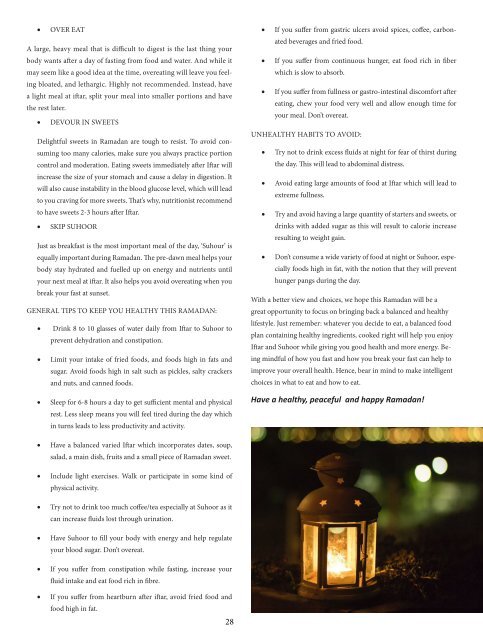You also want an ePaper? Increase the reach of your titles
YUMPU automatically turns print PDFs into web optimized ePapers that Google loves.
• OVER EAT<br />
A large, heavy meal that is difficult to digest is the last thing your<br />
body wants after a day of fasting from food <strong>and</strong> water. And while it<br />
may seem like a good idea at the time, overeating will leave you feeling<br />
bloated, <strong>and</strong> lethargic. Highly not recommended. Instead, have<br />
a light meal at iftar, split your meal into smaller portions <strong>and</strong> have<br />
the rest later.<br />
• DEVOUR IN SWEETS<br />
Delightful sweets in Ramadan are tough to resist. To avoid consuming<br />
too many calories, make sure you always practice portion<br />
control <strong>and</strong> moderation. Eating sweets immediately after Iftar will<br />
increase the size of your stomach <strong>and</strong> cause a delay in digestion. It<br />
will also cause instability in the blood glucose level, which will lead<br />
to you craving for more sweets. That’s why, nutritionist recommend<br />
to have sweets 2-3 hours after Iftar.<br />
• SKIP SUHOOR<br />
Just as breakfast is the most important meal of the day, ‘Suhour’ is<br />
equally important during Ramadan. The pre-dawn meal helps your<br />
body stay hydrated <strong>and</strong> fuelled up on energy <strong>and</strong> nutrients until<br />
your next meal at iftar. It also helps you avoid overeating when you<br />
break your fast at sunset.<br />
GENERAL TIPS TO KEEP YOU HEALTHY THIS RAMADAN:<br />
• Drink 8 to 10 glasses of water daily from Iftar to Suhoor to<br />
prevent dehydration <strong>and</strong> constipation.<br />
• Limit your intake of fried foods, <strong>and</strong> foods high in fats <strong>and</strong><br />
sugar. Avoid foods high in salt such as pickles, salty crackers<br />
<strong>and</strong> nuts, <strong>and</strong> canned foods.<br />
• Sleep for 6-8 hours a day to get sufficient mental <strong>and</strong> physical<br />
rest. Less sleep means you will feel tired during the day which<br />
in turns leads to less productivity <strong>and</strong> activity.<br />
• If you suffer from gastric ulcers avoid spices, coffee, carbonated<br />
beverages <strong>and</strong> fried food.<br />
• If you suffer from continuous hunger, eat food rich in fiber<br />
which is slow to absorb.<br />
• If you suffer from fullness or gastro-intestinal discomfort after<br />
eating, chew your food very well <strong>and</strong> allow enough time for<br />
your meal. Don’t overeat.<br />
UNHEALTHY HABITS TO AVOID:<br />
• Try not to drink excess fluids at night for fear of thirst during<br />
the day. This will lead to abdominal distress.<br />
• Avoid eating large amounts of food at Iftar which will lead to<br />
extreme fullness.<br />
• Try <strong>and</strong> avoid having a large quantity of starters <strong>and</strong> sweets, or<br />
drinks with added sugar as this will result to calorie increase<br />
resulting to weight gain.<br />
• Don’t consume a wide variety of food at night or Suhoor, especially<br />
foods high in fat, with the notion that they will prevent<br />
hunger pangs during the day.<br />
With a better view <strong>and</strong> choices, we hope this Ramadan will be a<br />
great opportunity to focus on bringing back a balanced <strong>and</strong> healthy<br />
lifestyle. Just remember: whatever you decide to eat, a balanced food<br />
plan containing healthy ingredients, cooked right will help you enjoy<br />
Iftar <strong>and</strong> Suhoor while giving you good health <strong>and</strong> more energy. Being<br />
mindful of how you fast <strong>and</strong> how you break your fast can help to<br />
improve your overall health. Hence, bear in mind to make intelligent<br />
choices in what to eat <strong>and</strong> how to eat.<br />
Have a healthy, peaceful <strong>and</strong> happy Ramadan!<br />
• Have a balanced varied Iftar which incorporates dates, soup,<br />
salad, a main dish, fruits <strong>and</strong> a small piece of Ramadan sweet.<br />
• Include light exercises. Walk or participate in some kind of<br />
physical activity.<br />
• Try not to drink too much coffee/tea especially at Suhoor as it<br />
can increase fluids lost through urination.<br />
• Have Suhoor to fill your body with energy <strong>and</strong> help regulate<br />
your blood sugar. Don’t overeat.<br />
• If you suffer from constipation while fasting, increase your<br />
fluid intake <strong>and</strong> eat food rich in fibre.<br />
• If you suffer from heartburn after iftar, avoid fried food <strong>and</strong><br />
food high in fat.<br />
28


